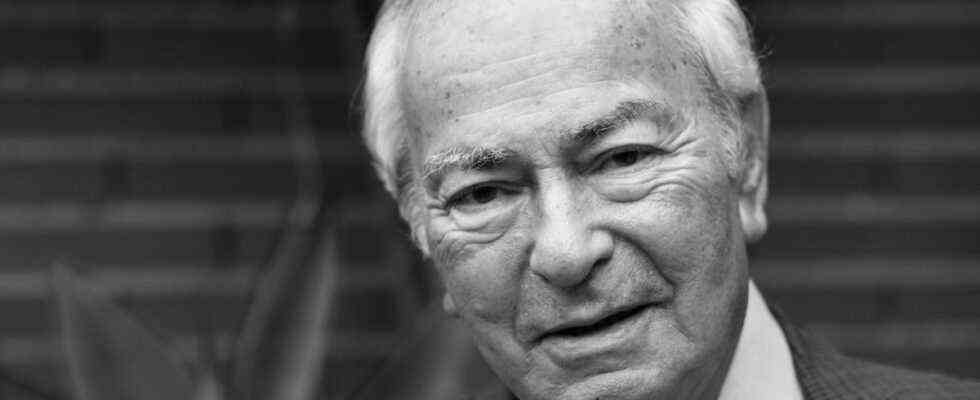He came too late on this mild day in East Berlin. But life doesn’t punish those who are late. For some there is even a historic opportunity.
The Italian journalist Riccardo Ehrman could not find a parking space in front of the press center in East Berlin on November 9, 1989, he searched and searched, inside the hall all the seats for the SED press conference with Günter Schabowski had long been taken. When Ehrman finally came into the hall, he could only sit in the front on the edge of the stage.
Jochen Arntz was editor of the Süddeutsche Zeitung until 2014, then editor-in-chief of the Berliner Zeitung. Today he is the spokesman for the Bertelsmann Foundation.
And that was exactly what made the difference on this day that was to make world history. Because Schabowski had a good eye on him on stage when the late arrival reported at 6:53 p.m. and criticized the fact that the GDR still did not want to grant its citizens any freedoms in the new draft laws: “My name is Riccardo Ehrman, I represent the Italian news agency Ansa. Mr. Schabowski, you mentioned mistakes. Don’t you think that this draft travel law that you presented a few days ago was a big mistake? “
A big mistake. Yes, Schabowski did that, at least from the perspective of the GDR leadership. When he tried to explain which trips should now be possible. Because he stammered a few sentences that not only Ehrman understood in such a way that the SED will open the wall. Immediately, immediately.
Nobody believed the line he telegraphed to Rome: “The fall of the Berlin Wall.”
Ehrman telegraphed his line to the news agency headquarters in Rome. “La caduta del muro di Berlino – the fall of the Berlin Wall.” But nobody believed him then. At least not at first.
Maybe it was all too much to believe right away. Because Riccardo Ehrman’s path to his brief appearance in German history was unbelievable enough.
He knew that himself. Years later, when he was already living in Madrid, a retired reporter, he told me about a life that would have lasted ten lives. And in which German history was not always as happy as it was on the day the Berlin Wall came down.
Ehrman, who liked to listen to Bach very loudly in his apartment, was the son of Polish Jews from Lemberg who had taken their honeymoon to Italy. Ehrman, on whose walls so many pictures from Berlin later hung, was born in Florence in 1929 because his parents simply had not returned to Poland. They had made themselves safe from what was coming. Before the Holocaust, before German history.
When he told the story at the end of the 1990s in Madrid, he was sitting in front of a bookshelf with a few volumes of Goethe supported by a bust of Karl Marx. Ehrman didn’t have to tell anything about the winding paths of the centuries. And about coincidences.
Actually, he shouldn’t have been in East Berlin anymore. But his predecessor fell ill.
Actually, on November 9, 1989, he shouldn’t have been in East Berlin at all. Ehrman was a reporter all over the world, he was a correspondent in Canada and the USA. From 1976 to 1982 he reported from the GDR, after which the agency sent him to India. He should have stayed there, but then his successor fell ill in East Berlin in the mid-eighties. Ehrman was asked if he wanted to go back to the GDR. He said yes. The rest is history.
But even this, the story of the press conference on November 9, 1989, is more complicated than it is often told. It was always clear to Ehrman, he was there. His question to Schabowski actually triggered everything, but in the end the fall of the wall was journalistic teamwork. Because after Ehrman Schabowski had asked the crucial question, he sat image-Reporter Peter Brinkmann and wanted to know when the new travel regulations for GDR citizens should come into force. The pressure on Schabowski was too great, as was the pressure on the Wall.
The Germans, after all, have shown their appreciation to Riccardo Ehrman. When he walked to the Berlin-Friedrichstrasse border crossing on the evening of November 9, 1989, people recognized the reporter from the press conference that had been televised. They took him and threw him in the air. Many years later he received the Federal Cross of Merit for the correct question.
Riccardo Ehrman died on Monday at the age of 92. He himself has classified his place in world history according to Oscar Wilde: “Life is a boring quarter of an hour with one good moment. My best moment was the press conference with Schabowski.”

